First Theatrical Release: June 15, 1994
First Home Viewing Release: March 3, 1995 (my 14th birthday!)
My Rating: 4/5 stars
Where I Found It: My Big Box o’ Disney Love
Bechdel Test Score: Failed. Female characters include Nala, Sarabi, and Shenzi. They don’t talk to each other.
I feel a bit nervous about writing this post, as I don’t really like The Lion King all that much, even though I know that many from my generation hold it in the same esteem that I hold Aladdin. I’ve always chalked it up to the fact that I am partial to Disney’s “human” stories, although in The Lion King we once more see Disney venturing into darker territory without much controversy because it does so with animal characters rather than human ones. Would a movie featuring humans have a prominent death-of-a-parent scene in which a child witnesses his own father murdered? Or show a man striking a woman,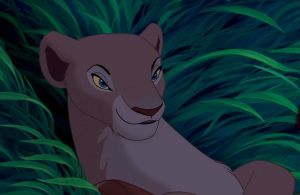 the way Scar does to Sarabi? (In Aladdin, Jafar raises his hand against Jasmine, but she ducks out of the way before he makes contact.) And I don’t feel totally convinced Disney would have gotten away with Nala’s “Come and get it, big boy,” look in “Can You Feel the Love Tonight?” if they had been human characters, nor would they have been likely to show the dude, ahem, on top. (We get supine kissing scenes in both Pocahontas and The Hunchback of Notre Dame, but the fact that the male lover in both cases is injured makes it somewhat less provocative.) And we can’t forget the scene where we get a glimpse of Mufasa’s harem, with Sarabi at rest beside him as if to imply monogamy.
the way Scar does to Sarabi? (In Aladdin, Jafar raises his hand against Jasmine, but she ducks out of the way before he makes contact.) And I don’t feel totally convinced Disney would have gotten away with Nala’s “Come and get it, big boy,” look in “Can You Feel the Love Tonight?” if they had been human characters, nor would they have been likely to show the dude, ahem, on top. (We get supine kissing scenes in both Pocahontas and The Hunchback of Notre Dame, but the fact that the male lover in both cases is injured makes it somewhat less provocative.) And we can’t forget the scene where we get a glimpse of Mufasa’s harem, with Sarabi at rest beside him as if to imply monogamy.
So, here is my main quibble with The Lion King — I expect it will be hotly contested, so I offer an alternative interpretation as well as some less political thoughts.
The Pride Lands: Where Might Makes Right?
Anyone who has been in the position of “underdog” might find Scar initially easy to relate to. He is a frail loner, and it is no wonder he feels inadequate next to his mighty, jock-like golden boy brother, King Mufasa. The movie never addresses whether Mufasa is king by birth (i.e., the oldest son) or by a contest of dominance. The fact that Mufasa is grooming his own oldest son to be king implies that it happened by birth, although in the real world lions fight for the right to lead just as dogs do. It’s easy to see how Mufasa could have won such a fight, and I even imagine that this might be where Scar received the wound for which he is named.
Along these same lines, it’s pretty unreasonable for Mufasa to be upset that Scar did not come to Simba’s presentation. Mufasa is the only adult male allowed in the pride; his very position as king, by its nature, casts Scar out. And then Scar is blamed for not being excited that this position of exile becomes permanent now that Mufasa has a son? (Of course, Scar
goes on to do some absolutely heinous things, shredding the sympathy we might have had for him pretty completely, but upon our introduction it’s not hard to find him relatable, or even for Mufasa to come across as a bit of a bully. This seems especially clear to me in the scene where Mufasa is egging Simba on to attack Zazu, as Zazu is trying to update Mufasa on the situation in the Pride Lands. Here we have a figure in the upper echelons of Mufasa’s administration, but does Mufasa teach his son to value him for all the work he does? Nope. He teaches him to see him as silly and ineffectual, something to be laughed at, toyed with, and bullied — and this is the “good guy.” OK, rant over.)
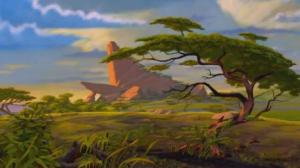 The movie clearly wants us to believe that Mufasa is a great king (and father), but I’m never sure exactly why. Sure, he has some wise-sounding dialog when he tells Simba about the Circle of Life and the Great Kings of the Past, but the main indication of his competence as a king seems to be the fact that the Pride Lands are verdant. And they are presumably verdant because the lions practice responsible hunting under Mufasa’s leadership. Mufasa also seems to be considered competent because of his ability to keep the hyenas out.
The movie clearly wants us to believe that Mufasa is a great king (and father), but I’m never sure exactly why. Sure, he has some wise-sounding dialog when he tells Simba about the Circle of Life and the Great Kings of the Past, but the main indication of his competence as a king seems to be the fact that the Pride Lands are verdant. And they are presumably verdant because the lions practice responsible hunting under Mufasa’s leadership. Mufasa also seems to be considered competent because of his ability to keep the hyenas out.
Indeed, the main criticism Nala gives of Scar’s leadership later in the movie is that he “let the hyenas take over the Pride Lands.” With both the hyenas and the lions competing for the same prey, they quickly overhunt the area and teeter on the brink of starvation. So it follows that a major pillar of Mufasa’s “success” as King is the fact that he kept the hyenas away.
The hyenas reside beyond the elephant graveyard, where nothing seems to grow and thus prey must be scarce. Is this a result of the hyenas poor management of their resources, or is it the result of the lions forcing them out of the best hunting grounds?
 This seems analogous to two real-world scenarios, neither of which scream, “Fantastic leadership!” to me.
This seems analogous to two real-world scenarios, neither of which scream, “Fantastic leadership!” to me.
As a legal news reporter covering the state of South Dakota, which has the highest Native American population in the United States, I’m much more aware of Native American issues than I was in the past. Seeing the land the hyenas are relegated to in The Lion King, I couldn’t help but think of how Europeans shoved the country’s entire Native population on to the least desirable land and told them to stay there and feel lucky to have it.
The second analogy is related to immigration, and the idea that to be successful as a country, we have to hoard what we have and make sure the “outsiders” stay “out.” This seems similar to Mufasa’s approach to the lion/hyena problem: there is plenty to go around in the Pride Lands, but ONLY if the hyenas stay on their side of the border. This interpretation is exacerbated by the fact that the only two hyenas with speaking parts are voiced by actors of color.
And why is it that the lions ended up with the better hunting grounds in the first place? Because Mufasa and his pride possess more brute strength than the hyenas do. There seems to be a real current of racial/class warfare underscoring the central political conflict in The Lion King, and yet we are meant to swallow it as a simple case of “good” vs. “evil.”
Yet, Scar and the hyenas echo similar language to Mufasa’s about how we’re all connected in the “great circle of life” when, during “Be Prepared,” Scar and the hyenas declare that, “It’s great that we’ll soon be connected.”
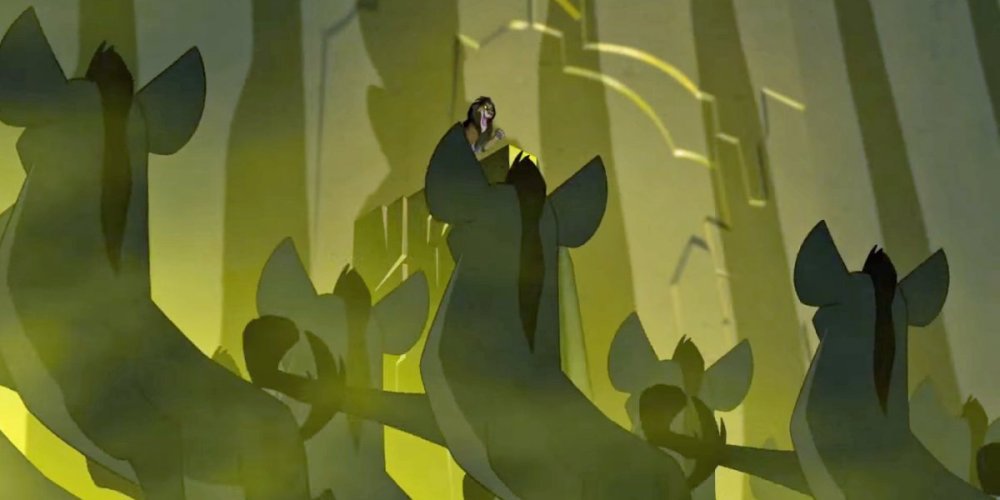 One has to wonder, where does Mufasa see the hyenas fitting in the great Circle of Life? Is it also part of the natural order for some species to starve on the margins while the stronger ones enjoy their bounty? Of course, that natural order is so much more palatable when you are on top.
One has to wonder, where does Mufasa see the hyenas fitting in the great Circle of Life? Is it also part of the natural order for some species to starve on the margins while the stronger ones enjoy their bounty? Of course, that natural order is so much more palatable when you are on top.
The Pride Lands: Good Stewardship vs. Exploitation
My husband’s interpretation of the tension between the lions and the hyenas is more generous, and thus probably more in line with Disney’s intent, if it had one at all besides setting up worthy antagonists. His take is that the lions are the “good stewards” of the land, as is evidenced by Mufasa’s understanding of and respect for the “Circle of Life.” The hyenas, on the other hand, are exploitive — they’re there to selfishly use resources up with no thought of the consequences or the future.
Either interpretation works, but the troubling thing is that even the more optimistic interpretation hinges on keeping one party out. And that question of whether the hyenas were pushed into the subpar territory or had perfectly good territory that they ruined still niggles at me.
Know what else niggles at me? Why Scar’s hostile takeover of the Pride Lands caused all the grass to die and the water to dry up. Overhunting certainly explains the hunger, but if the herds had “moved on,” wouldn’t that mean there would be more, not less, grass? And nothing explains the dried up river, unless those hyenas are really, really, really, really thirsty. Could it be that Scar just came to power during a drought? That’s some unfortunate timing.
I’m sure the Pride Lands going all post-apocalyptic is mostly symbolic, but it is one of those things that leaves me scratching my head as an adult even though it never registered when I was a kid.
But Oh, All the FEELINGS
Even though it doesn’t do a lot for me (mostly because I don’t like Simba or Mufasa much as characters), I can see why this movie made such an impact on people. It’s partially based on Hamlet, and has all the high drama and tragedy one would expect from Shakespeare. It probably takes the most acute look at death and grieving of anything in Disney’s canon. Despite the abundance of dead mothers, the lasting effects of grief are glossed over in most every movie. Even in Bambi, often cited as one of the most tragic, the mother’s death is dealt with by a simple fade to black and a convenient skip into the future.
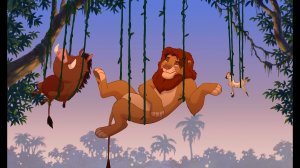 Here, Simba’s grief follows him right past the montage to the future. Sure, within a few minutes of his father’s death he is singing “Hakuna Matata” with Timon and Pumbaa. But it’s precisely his father’s death that makes this life so compelling to him, that makes him distance himself to the point that his very identity becomes blurred. This is no small change for the cub who just couldn’t “wait to be king.” In real life grief can drive people to alcohol, drugs, promiscuity, or months or years of lethargy. This is a kid’s movie, but Simba falls prey to “escapism” nonetheless, and the most triumphant point in the movie is not when he defeats Scar or when he presents his own cub, but when he makes the decision to go back and to claim his birthright — to be the person (er, lion) he really is.
Here, Simba’s grief follows him right past the montage to the future. Sure, within a few minutes of his father’s death he is singing “Hakuna Matata” with Timon and Pumbaa. But it’s precisely his father’s death that makes this life so compelling to him, that makes him distance himself to the point that his very identity becomes blurred. This is no small change for the cub who just couldn’t “wait to be king.” In real life grief can drive people to alcohol, drugs, promiscuity, or months or years of lethargy. This is a kid’s movie, but Simba falls prey to “escapism” nonetheless, and the most triumphant point in the movie is not when he defeats Scar or when he presents his own cub, but when he makes the decision to go back and to claim his birthright — to be the person (er, lion) he really is.
This movie also takes a deeper look at shame than any of the others does. Simba’s a bit of a brat as a cub, but it’s this self-centeredness that primes him to believe that his father’s death really is his fault. So many of us carry the shame of our childhoods with us into adulthood, almost always unwarranted, and fear, like Simba does, that our mothers will look at us differently if they ever know who we “really” are. I wish Disney had given a few more moments to the scene where Scar accuses Simba of killing his father and we see the shock and doubt on his mother’s face — Simba lets go of his shame when Scar admits that he killed Mufasa, but we never get that moment of being totally reassured that his mother still loves him anyway.
So I can see how this movie could be really powerful for someone who finds this particular emotional journey to be resonant. But I just got too hung up on hyenas and abused staff.

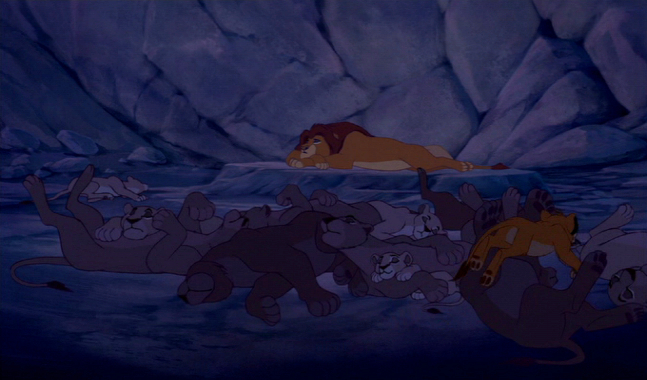


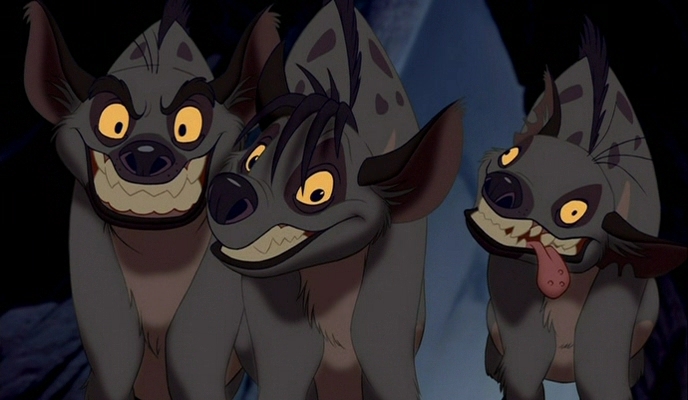



“the only two hyenas with speaking parts are voiced by actors of color.”
Mufasa is also voiced by an actor of color.
LikeLike
Right — and so is young Nala (adult Nala seems ethnically ambiguous) and Rafiki. So there are people of color voicing good guys and bad guys in this film, but the hyenas are the only species where the only speaking parts are played by people of color.
LikeLike
I haven’t seen this movie in so long that I can’t really say anything all that informed, but when I THINK about the movie, the only things that excite me about watching it are the scenes with Scar and the hyena’s. Even if they’re evil, they seem like the only actually interesting characters.
LikeLike
I agree — Scar and the hyenas are definitely the most interesting characters in this one. Also, Scar totally gets the best song — “Be Prepared!” is so much better than “Can You Feel the Love Tonight?”
LikeLike